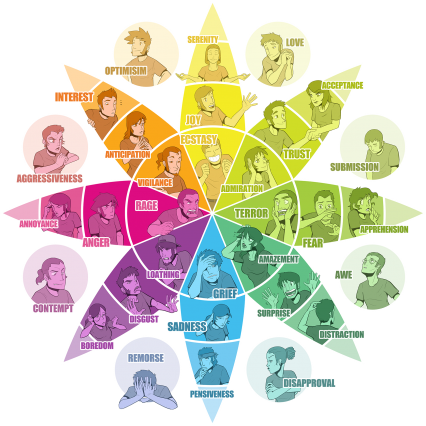In the common experience of everyday life, anger is treated as a negative emotion. It is seen as the top manager of a destructive power. Overall, we are told to manage it in order to keep it at bay. I think, this scary image about anger is not fair when you consider the big picture about it. One of three powers of the ego, anger is our immune system's behavioral manifestation to repel evil, avoid loss or prevent damage.
However, the definition and description of evil show variations from person to person, despite some universal commonalities. Plus, at the core, every individual prioritizes their personal or their own family's/company's/etc. well being, which sooner or later may contradict with the well being of others, or even with their existence and life. Such contradictions are the birthplace of anger.
When we get angry, the famous fight or flight response mechanism is triggered in our body. That is, we become more energetic to take action, and our attention is focused precisely on what threatens us. This state of psychology is very much like an arrow, placed on a bow and the string pulled all the way back. As you would appreciate, if in case of a war, this is exactly what you need; but at the same time, this is exactly when mistakes are made, hence the negative fame of anger.
So, anger is like fire. It is powerful, and needs care when handling; but it is by no means evil in the absolute sense. Anger management is born from this conclusion. It is aimed at harvesting the advantages of anger while avoiding the disadvantages. Expressed differently, what we call anger is a state of mind when anger takes the lead of other two powers of the ego. So, in case of untamed anger, wisdom and lust serve to warrant self-interest at the expense of what is in the target. Conversely, tamed anger, or you can call this anger management, ensures well-being of the self within the framework of certain rules. These rules can be due to laws, traditions, or religious/ethical values.

In life, we get angry towards people or events, and sometimes towards ourselves. These situations have been the focus of much thought and many studies. A simple search on anger can lead you to countless online sources. So, I am not going to spend time with this branch of the topic other than employing its results to understand the human psyche in context of anger. What I really want to do is to understand how anger affects our relationship with our Creator. That is, I want to explore "the anger towards God".
Before we embark on this subtle and sensitive topic, let's garner the lessons learned from the study of anger. First, it is a behavioral immune response in the face of a threat to our well-being materially, psychologically or spiritually. Second, anger focuses our attention towards the threat, which has the side effect of narrowing our perspective, as well. Third, getting angry makes us more energetic; in fact, too energetic. Fourth, anger utilizes the pathways in our minds that ensure the shortest and quickest, but not necessarily wisest, way to defeat a threat. Five, fear and grief are two factors that seed anger. So, untreated grief or fear yields anger towards their source in the long run.
You may be asking yourself "why would anyone be angry towards God?". Or, you may be thinking that a person who gets angry with God can not be a believer, but an arrogant disbeliever. It is also possible that you are relieved upon seeing this discussion, for you have seen at last that you are not the only one angry with God. Or you may just be wondering where this discussion is going. Whatever the case, if you make a search on "angry with God", you are going to see that this is not a new matter at all.

In fact, it is part of an all-time discussion on existence of evil despite a God who introduces Himself as merciful and compassionate. The general discussion of the problem of evil is not going to be my focus here. Rather, I want to explore from an Islamic perspective the individuals' relationship with God when clouded by anger. I thought this is worth exploring, because, one, Islam means submission and that notion is dictated to the Muslims as an obligation to suppress their feelings and thoughts if they mean objection to God's decree, two, the modern times are getting ever more full of situations where people find it hard to justify what befalls them with the compassion and wisdom of God. In short, how do you accommodate your anger towards God in context of Islam? Or, do you, in the first place?
As a start, consider the following sample cases:
- You were a child. Your father was killed by the soldiers of an invading country that wants to exploit the natural resources there. Your mother and sister were raped, and killed. And you were beaten until you fell unconscious. As these were happening, you constantly prayed to God, but nothing happened. Later on, you were rescued by volunteer groups who took you to another country, where you were raised near a foster family who were atheists. When you grew up, even the thought of God drove you crazy.
- You were born with non-traditional sexual traits, but these were left unnoticed until your adolescence. When things surfaced, your family and your close friends became your enemy. They outcast you as if you were devil, and must be annihilated. Left alone, you found yourself a new set of friends, who had similar traits as you or who did not bother these issues. However, unlike your religious family, your new social environment was rather far from God. Since you have done nothing wrong, but just had the God-given properties at birth, you cannot justify in your mind and soul the animosity from your family and the older group of friends. You are suffering deeply in your heart, praying from the depths of your heart, but the God, who created you as you are, seems to be indifferent to your suffering in the face of unfair animosity from people.
- You served to the education of people and did your best to proclaim the message of mercy from God. One day, you were slandered, and were put in prison without any questioning or trial. Nobody asked you anything nor made any explanations. You didn't know what was happening and why. Then, occasional tortures started. Your cries and flowing blood were considered as a sign of success by the guardians. And the One who admonished you to pray for help stayed silent while witnessing all of the injustice. The thought of being abandoned by your Protector to the hands of lions suffocated your heart, but you resisted, thinking that this is but a trial. However, days, weeks, months followed, and nothing changed. Not being able to see the end of the tunnel, you increased your prayers. You added your tears to your implorations for God. Still, nothing changed in your situation. You started fighting against your own mind in order not to accept the picture surrounding you: you are left alone. As time went on, more people were added to the list of unfairly treated. Even the new-born babies were imprisoned along with their moms. You are not able to defeat that thought anymore. All evidences show that even the One for whom you risked everything is siding with the wrongful enemy!
If you say that you went through such heavy burdens, and never felt shaken in your faith, even a minute, either your faith is real and strong, thank God, or you are lying to yourself, because you deliberately suppressed your feelings and thoughts since they were flavored with rebellion against God's decree. This, however, does not mean that your subconscious is accepting whatever you are dictating at it. Rather, your subconscious goes on with its job unbeknownst to you. Your worship gradually becomes robotic and repetitive. Your thoughts and explanations of faith matters evolve into being irrational and dogmatic, because rational thought necessitates tangible evidence and in your case, the rational evidences point at the discrepancy between your faith and the existing conditions around you.
"Do men imagine that they will be left (at ease) because they say, We believe, and will not be tested with affliction? And certainly We tried those before them, so Allah will certainly know those who are true and He will certainly know the liars." (29/2-3)
"When they came upon you from above you and from below you, and when the eyes grew wild and the hearts reached to the throats, and you were harboring doubts about Allah." (33/10)
























